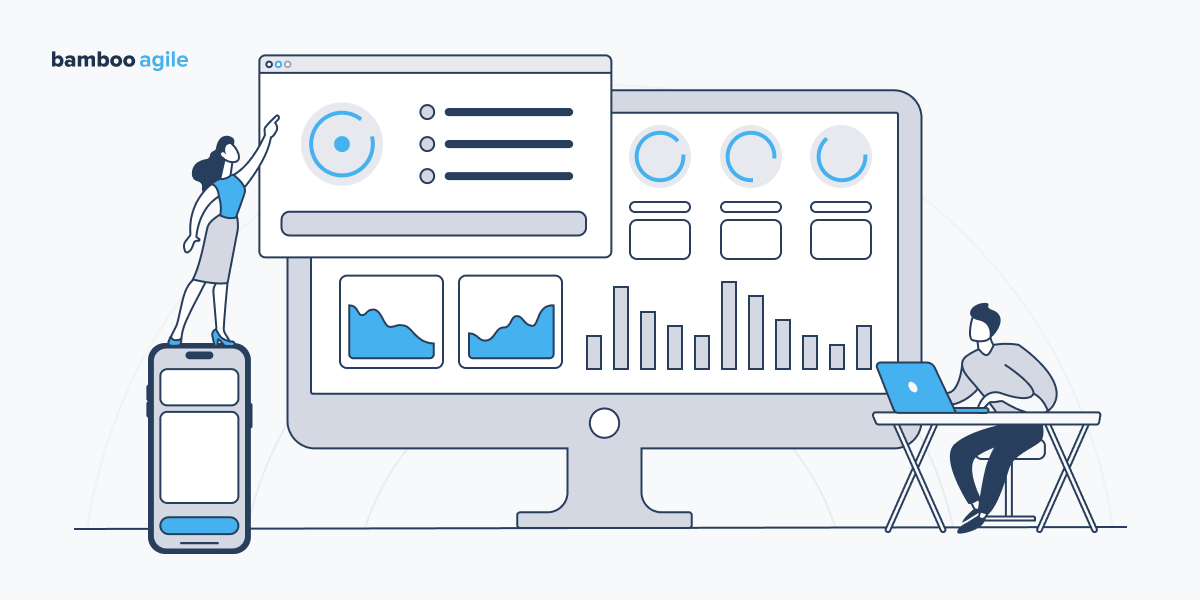Introduction
Managing a large-scale business is a difficult task. And it’s even more difficult to stimulate consumers’ interest in your B2B or B2C business in today’s digital-first environment.
That is why you want a cutting-edge web solution. It is not only beneficial to your online visibility, but it is also beneficial for your internal processes. Because enterprise web solutions go beyond standard CMS-based websites, they can be directly integrated with your business processes and assist you in running day-to-day operations smoothly and flexibly.
In this article, we’ll discuss the significance of enterprise web application development and assist you in answering the question, “Does my enterprise really need a web app?”
Let’s get started.
What is Enterprise Web Development
First of all, let’s start with some basics.
An enterprise website is a set of web pages that share a single domain name and represent your company. The website enables you to establish an online presence and expand your audience reach.
Enterprise websites differ from ordinary websites in that they require various features and tools to design and have a specific content management system known as Enterprise Content Management (ECM).
Enterprise web apps are web-based applications that allow you to manage the internal and external demands and activities of a company. A web application helps you prepare for digital transformation and meet modern business needs.
It is vital to note that an enterprise web application might be restricted for internal usage, such as inter-departmental communication, or it can provide a wide range of external services, such as customer relationship management.
Now that we know what enterprise websites and web applications are, we can say that enterprise web development is a process of developing a website or application for mid- and large-scale businesses.
How Do Enterprise Website and Web App Differ
Many people mix up enterprise websites with web apps. It is critical to distinguish between these terms.
As was mentioned earlier, an enterprise website is made up of web pages that enable the company to retain online exposure and reachability. A web application is a complete application that manages both internal and external processes.
Why Do You Need an Enterprise Web Application
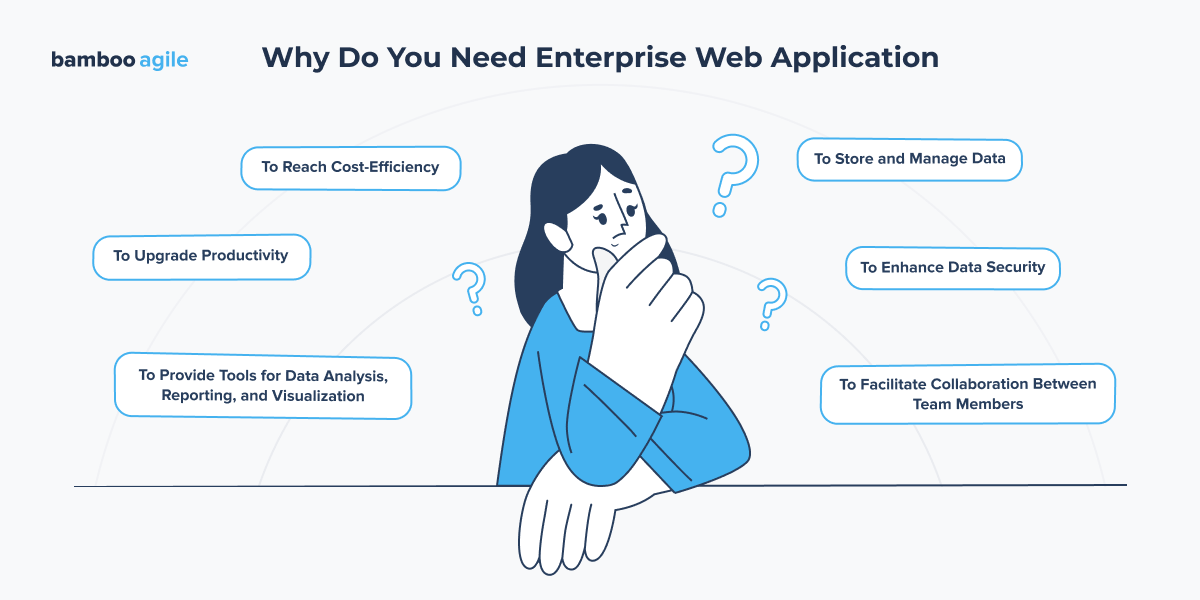
For enterprises of various sizes, industries, and dimensions, enterprise web applications provide numerous advantages. Here are some of the most significant benefits of effective enterprise web development.
To Upgrade Productivity
Enterprise web apps are designed to deliver innovative solutions to complex issues as well as to optimise corporate operations to improve the overall structure. These apps aid in the development of more structured internal processes and improved modules for corporate tasks, resulting in increased productivity and faster business growth.
Web apps can automate tasks, streamline processes, and eliminate manual data entry, leading to increased efficiency and productivity. For example, an HR department could use a web app to manage employee onboarding and offboarding processes, automating tasks like creating accounts, issuing access cards, and assigning benefits.
To Facilitate Collaboration Between Team Members
Web applications improve collaboration and communication within a company. Real-time collaboration, project management tools, texting, and document sharing all help to improve teamwork and information exchange within the organisation.
To Provide Tools for Data Analysis, Reporting, and Visualisation
Providing tools for data analysis, reporting, and visualisation is a key feature of enterprise web apps. This ability empowers businesses to gain insights and make more informed decisions.
Enterprise web apps can integrate with various data sources to collect and organise data and then analyse it to identify trends, patterns, and anomalies. This can provide valuable insights into business operations, customer behaviour, market trends, and other relevant areas.
Such solutions can also generate reports that present the findings of automated data analysis. These reports can be tailored to specific audiences and can include charts, graphs, and other visual elements to enhance understanding.
To Store and Manage Data
Web apps can integrate with existing data sources and provide users with tools for analysing and visualising data. This can help businesses better understand customer behaviour, market trends, and operational performance.
To Enhance Data Security
Your enterprise web apps and associated important data are protected from breaches and cyber-attacks with the help of cloud-based network security. This ensures secure transactions and keeps your digital assets safe from unauthorised access.
To Reach Cost Efficiency
An enterprise web application is cost-effective because it is a code-once run-anywhere software component that can be readily scaled and made accessible to a large number of people via the cloud. In addition, enterprise web apps provide good ROI, because they combine numerous essential goal-oriented functions into a single application.
Enterprise Web Application: Essential Features
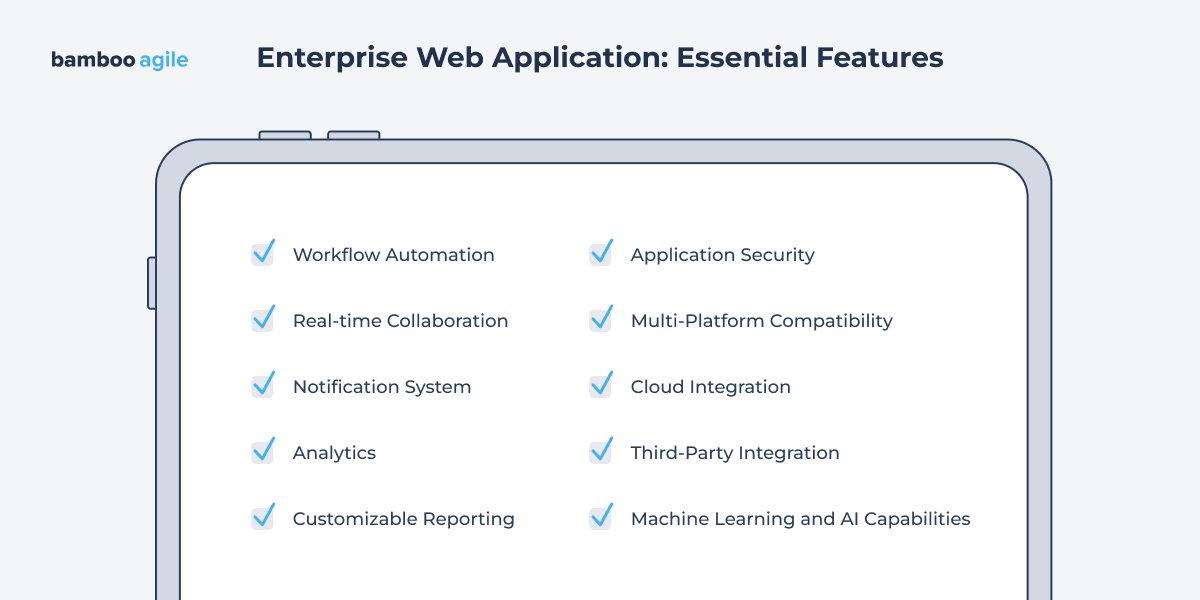
An enterprise web app must have features that are both generally useful and unique to the business the software is designed for.. These are some examples of essential general features.
Workflow Automation
Workflow automation is a crucial feature for enterprise web apps as it enables businesses to streamline processes, improve efficiency, and reduce manual work. By automating repetitive tasks and ensuring seamless handoffs between every step, workflow automation can significantly enhance the overall productivity of an organisation.
Enterprise web applications can automate their workflows using various tools, including process modelling, task orchestration, integration with backend systems, user notifications and alerts, and visual representation.
Among the ways that workflow automation can benefit businesses are:
- reduced manual work;
- faster processing;
- reduced errors;
- improved compliance;
- enhanced decision-making.
Real-time Collaboration
Real-time collaboration is another crucial feature of enterprise web development as it enables businesses to enhance communication, coordination, and productivity among team members. By enabling users to work together simultaneously on documents, projects, and tasks, real-time collaboration can break down silos and foster a more collaborative work environment.
Businesses can implement real-time collaboration in their enterprise web applications to get such features as real-time document editing, instant messaging and chat, shared workspaces and projects, real-time notifications, and collaborative editing tools.
Real-time collaboration can improve your business with:
- enhanced communication;
- improved coordination;
- increased engagement;
- accelerated decision-making;
- improved innovation.
Notification System
A robust notification system is an integral part of enterprise web applications, ensuring that users are kept informed about important updates, events, and changes within the application. Effective notifications can improve user engagement and productivity, and reduce the risk of errors or important information being missed.
Enterprise applications can use notification systems for real-time push notifications, in-app notifications, email notifications, personalised notifications, and notification filtering.
A well-designed notification system can benefit your businesses by:
- enhancing user engagement;
- improving productivity;
- reducing the risk of errors;
- improving customer service;
- enhancing security.
Analytics
Analytics is a crucial feature of enterprise web applications as it empowers businesses to gain insights from data, identify trends, and make data-driven decisions. By analysing user behaviour, usage patterns, and performance metrics, businesses can optimise their applications and improve their overall operations.
Enterprise software can employ data collection, data aggregation, data analysis, data visualisation, and actionable insights to deliver a sophisticated analytics package.
Analytics can benefit businesses in several ways:
- user understanding;
- application optimisation;
- predictive modelling;
- data-driven decision-making;
- compliance and security.
Customisable Reporting
Customisable reporting is another crucial feature of enterprise web applications as it empowers businesses to generate tailored reports that meet specific needs and requirements. By allowing users to filter, aggregate, and visualise data in various ways, businesses can gain deeper insights into their operations.
Customisable reporting can be encorporated through data drill-down, customisable dashboards, interactive visualisations, customisable report templates, and scheduled reporting.
The benefits of customisable reporting for business are:
- targeted insights;
- data-driven decision-making;
- enhanced compliance;
- improved communication and collaboration;
- continuous improvement.
Application Security
Application security is one of the most critical aspects of enterprise web applications as it safeguards sensitive data, protects against cyberattacks, and ensures compliance with industry regulations. By implementing robust security measures, businesses can protect their assets, maintain customer trust, and minimise potential disruptions to their operations.
You can outfit your app with multi-step authentication and authorisation and data encryption, as well as use secure coding practices, vulnerability scanning and patching, penetration testing, security awareness training, and regular security audits.
Among the advantages of application security are:
- data protection;
- breaches prevention;
- customer trust improvement;
- business continuity;
- compliance with regulations;
Multi-Platform Compatibility
Multi-platform compatibility enables businesses to reach a wider audience and provide a seamless user experience across different devices and operating systems. By developing applications that can be accessed and used on various platforms, businesses can cater to a more diverse user base and expand their market reach.
For example, your enterprise web app can implement cross-browser compatibility, responsive design, progressive enhancement, and hydration.
Benefits of multi-platform compatibility:
- reaching a wider audience;
- seamless user experience;
- cost-effective development;
- reduced deployment complexity;
- maintaining a competitive edge.
Cloud Integration
Cloud integration is a crucial aspect of enterprise web applications as it enables businesses to leverage the scalability, flexibility, and cost-effectiveness of cloud platforms. By integrating with cloud-based services and infrastructure, businesses can enhance their application capabilities and adapt to changing business needs more efficiently.
Cloud integration can be incorporated in various ways, including cloud deployment, cloud-based APIs, cloud storage and backup, cloud-based Machine Learning, and cloud-based IoT connectivity.
Benefits of cloud integration for enterprise web apps:
- scalability and elasticity;
- reduced IT infrastructure costs;
- enhanced agility and innovation;
- access to specialised services;
- increased security and compliance;
Third-Party Integration
Third-party integration is another crucial aspect of enterprise web applications as it enables businesses to connect their applications with external systems, services, and data sources. By integrating with third-party tools and APIs, businesses can expand the functionality of their applications and streamline workflows.
Third-party integration can be used in different ways, including API integration, data exchange, workflow automation, business process management, and Customer Relationship Management (CRM) integration.
Benefits of third-party integration for enterprise web apps:
- functionality enhancement;
- workflow optimisation;
- data aggregation;
- cost-effectiveness;
- competitive advantage;
- vendor management;
- supply chain visibility.
Machine Learning and AI Capabilities
Machine learning and AI capabilities are becoming increasingly popular for enterprise web applications as they enable businesses to make data-driven decisions, automate tasks, and enhance user experiences.
Some of the ways ML and AI can be implemented in enterprise web applications are predictive analytics, recommendation systems, Natural Language Processing (NLP), Computer Vision, and automated insights.
The benefits of Machine learning and AI for enterprise web apps are:
- data-driven decisions;
- task automation;
- enhanced user experiences;
- fraud detection;
- risk management;
- compliance management.
Enterprise Web Software Application Development Process
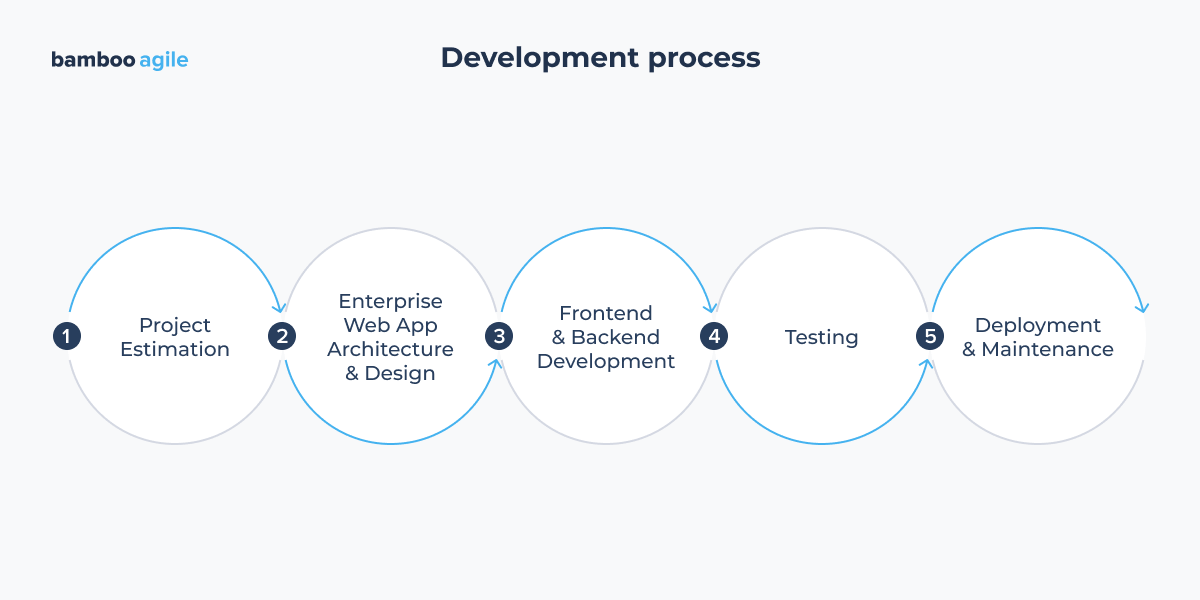
Enterprise web application development is a multi-phase process that begins with conceptualisation and ends with implementation. This section describes the major stages involved in building enterprise web apps.
Project Estimation
The initial stage of enterprise app development is estimating the whole project – from budget to design, from functionality to deployment; everything is conceived and documented during this phase.
During estimation, project managers, software architects, or tech leads will construct a detailed plan, covering the necessary tech stack, web application frameworks, platforms, extensions, structures, dependencies, architecture, timeline, and overall cost. This keeps the development on track with concrete objectives and offers a solid basis for the entire process.
Enterprise Web App Architecture & Design
The next step is creating the enterprise web application’s architecture to visualise how the app will look and how it will perform various enterprise functions. This is a critical step in creating the groundwork for the future enterprise web application architecture and deployment.
At this point, the software designers/architects pull together the entire architecture – the databases, servers, management tools, and client modules – to provide an in-depth review of its design. A flexible, yet organised infrastructure is essential for understanding how the modules and service will scale in response to changing business needs.
Frontend & Backend Development
This phase entails the fundamental development of the software, where code is created and all the various software modules are developed. During this stage, the frontend and backend developers will collaborate to create efficient modules that meet the development goals.
This includes UI/UX design, database connectivity, business logic execution, API integrations, and server administration. This is one of the most important stages in determining the general level of quality and profitability of your project. So having a highly qualified staff with extensive expertise working on your project is critical.
Testing
After the front and backend development is completed, the web application is tested and quality assurance for the total project is performed. This phase is critical before release, as it helps iron out any problems, disparities, security flaws, and errors, making the best possible first impression.
There are various sorts of testing performed by software testers and QA engineers to ensure that the final product functions effectively and is without error. Among the most common testing approaches are unit testing, integration testing, system testing, regression testing, and alpha testing.
Deployment & Maintenance
The final stage of the development process involves installing the software on a production server and optimising it through high-quality maintenance procedures. To guarantee a smooth transition to the live environment, the code is deployed on the production environment first. The process is accompanied by a variety of tasks, such as platform configuration, file compression, caching, and load balancing.
Maintenance, in addition to deployment, is critical to ensuring a consistent, optimised user experience and solid security. It necessitates continuous monitoring of the enterprise web application and the distribution of timely upgrades. It is a continual activity that ensures the enterprise web application’s high availability, quality, and overall performance for years to come.
Great Examples Of Enterprise Web Apps and The Benefits They Provided
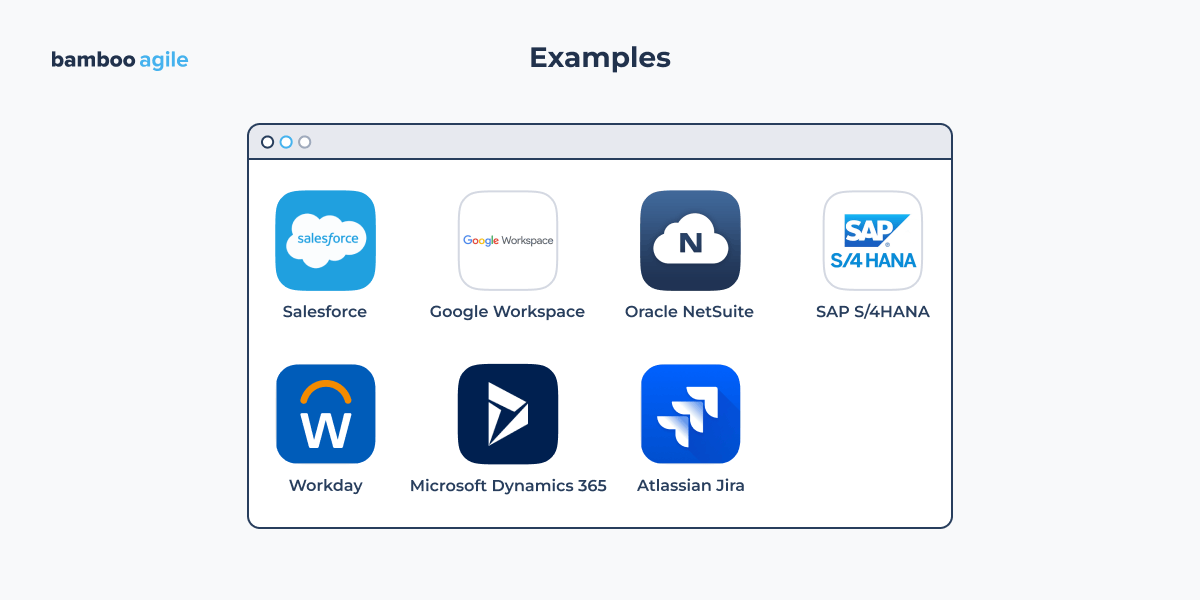
If you want to develop an enterprise app for your company but want to check how other enterprise apps are performing in the market in various categories, you’ve come to the right place. Here are some of the top enterprise web apps currently on the market.
Salesforce
Salesforce is a cloud-based customer relationship management (CRM) platform that helps businesses of all sizes manage their customer interactions, sales pipelines, marketing campaigns, and customer service operations. It is one of the most popular CRM platforms in the world, and it is used by businesses of all sizes, from small startups to Fortune 500 companies.
Here are some of the benefits of using Salesforce:
- Improved customer relationships. Salesforce provides businesses with a centralised platform to store and manage customer data, track customer interactions, and personalise customer experiences. This can help businesses build stronger relationships with their customers and improve customer satisfaction.
- Boosted sales productivity. Salesforce’s sales automation features can help businesses streamline their sales processes, save time, and close more deals. These features include lead management, opportunity tracking, and sales forecasting.
- Enhanced marketing effectiveness. The solution’s marketing automation features can help businesses create targeted marketing campaigns, track campaign performance, and measure ROI. These features include email marketing, lead scoring, and lead nurturing.
- Streamlined customer service. Salesforce’s customer service features can help businesses provide efficient, personalised customer support. These features include case management, knowledge management, and self-service portals.
- Increased data insights. Platform’s analytics and reporting features can help businesses gain insights into customer behaviour, sales performance, and marketing effectiveness. These insights can help businesses make informed decisions and optimise their operations.
Google Workplace
Google Workspace is a suite of productivity applications that includes Gmail, Calendar, Drive, Docs, Sheets, Slides, Forms, Sites, Keep, Apps Script, and Jamboard. It is a cloud-based application that can be accessed from anywhere, and it offers a wide range of features for collaboration and productivity.
Among the benefits of Google Workplace for business are:
- Improved collaboration. Google Workspace makes it easy for teams to collaborate on documents, spreadsheets, presentations, and more. With real-time editing and commenting, teams can work together on projects in real time, from anywhere in the world.
- Enhanced productivity. The platform is packed with features that can help businesses improve their productivity. For example, Gmail has features like snooze and labels that can help you manage your inbox more effectively. Docs, Sheets, and Slides have a variety of templates and features that can help you create professional-looking documents, spreadsheets, and presentations quickly and easily.
- Reduced costs. Google Workspace is a cloud-based application, which means that businesses do not need to purchase and maintain their own servers. This can save businesses a significant amount of money on hardware and software costs.
- Improved security. Google’s solution is a secure application that is backed up regularly. Businesses can also control who has access to their data and set up different levels of security for different users.
- Scalability. Google Workspace can grow with a business, and it can easily be shared with new employees. This can save businesses time and money in the long run.
Oracle NetSuite
Oracle NetSuite is a cloud-based enterprise resource planning (ERP) system that helps businesses of all sizes manage their finances, operations, and customer interactions. It is a comprehensive application that can be customised to meet the specific needs of a business.
The benefits of Oracle NetSuite:
- Improved visibility. Oracle NetSuite provides businesses with real-time visibility into their financial performance, operational efficiency, and customer relationships. The business can benefit from this by making better decisions and improving their bottom line.
- Increased agility. Oracle’s ERP is a cloud-based application that is easy to deploy and update. Businesses can quickly adapt to changing market conditions and business needs.
- Reduced costs. Oracle NetSuite can help businesses reduce their IT costs by eliminating the need to purchase and maintain their own servers and software.
- Improved productivity. The platform can help businesses automate tasks and streamline processes. This can free up employees to focus on more strategic activities.
- Enhanced compliance. Oracle NetSuite is a compliant application that helps businesses meet their financial and regulatory requirements.
SAP S/4HANA
SAP S/4HANA is a cloud-based ERP system that is designed to help businesses of all sizes become more agile, efficient, and customer-centric. It is a modern and innovative ERP system that is built on the SAP HANA in-memory database, which provides real-time performance and data insights.
Here are some of the benefits of using SAP S/4HANA:
- Improved agility. SAP S/4HANA can help businesses quickly adapt to changing market conditions and customer needs. This is because it is a cloud-based application that is easy to deploy and update.
- Increased efficiency. The solution can help businesses automate tasks and streamline processes. This can free up employees to focus on more strategic activities.
- Enhanced customer experience. SAP S/4HANA can help businesses provide a better customer experience by providing real-time insights into customer behaviour. Businesses can identify and address customer needs more quickly with this platform.
- Reduced costs. The platform can help businesses reduce their IT costs by eliminating the need to purchase and maintain their own servers and software.
- Improved decision-making. SAP S/4HANA can help businesses make better decisions by providing real-time insights into their data. Businesses can identify opportunities and risks and make more informed decisions.
Workday
Workday is a cloud-based human capital management (HCM) platform that helps businesses manage their people, payroll, benefits, and training. It is a user-friendly application that can be accessed from anywhere and used by employees, managers, and executives.
Among the benefits of using Workday are:
- Improved efficiency and productivity. Workday can help businesses automate many of their HR processes, which can free up employees to focus on more strategic activities. This can lead to improved efficiency and productivity.
- Increased employee engagement. The platform can provide employees with a more personalised experience, which can lead to increased engagement and satisfaction. The benefit for business is that this can help to improve retention and reduce turnover.
- Reduced costs. Workday can help businesses reduce their HR costs by automating many of their processes and eliminating the need for manual data entry.
- Improved compliance. This solution can help businesses to comply with all applicable laws and regulations. The risk of fines and penalties can be reduced with this platform.
- Real-time insights. Workday provides businesses with real-time insights into their HR data, which can help them to make better decisions. Workaday can improve performance and efficiency.
Microsoft Dynamics 365
Microsoft Dynamics 365 is a comprehensive cloud-based suite of business applications that helps organisations manage their customer relationship management (CRM), finance, operations, and supply chain.
Benefits of Microsoft Dynamics 365
- Improved customer experience. Microsoft Dynamics 365 helps businesses provide a more personalised and consistent customer experience across all channels.
- Increased efficiency. The platform can help businesses automate processes, improve collaboration, and reduce costs.
- Enhanced data insights. Microsoft Dynamics 365 provides businesses with real-time insights into their data, which can help them make better decisions.
- Improved agility. This solution is a cloud-based application that can be easily scaled to meet the needs of a growing business.
- Reduced risk. Microsoft Dynamics 365 is a secure application that can help businesses comply with regulatory requirements.
Atlassian Jira
Atlassian Jira is a project management tool that helps teams organise, track, and manage their work. It is a popular tool used by businesses of all sizes, from small startups to large enterprises.
Benefits of using Atlassian Jira
- Improved project visibility. Jira provides teams with a clear overview of their work. This can help to improve project planning, decision-making, and communication.
- Increased productivity. The solution of Atlassian can help teams to work more efficiently by automating tasks, streamlining workflows, and providing a central location for all work items.
- Enhanced collaboration. Jira can help teams collaborate more effectively by providing a shared workspace and communication tools.
- Improved decision-making. The platform can help teams to make better decisions by providing insights into their work data.
- Reduced risk. Jira helps teams to reduce risk by identifying and addressing problems early on.
Why Choose Bamboo Agile for Enterprise Web Application Development?
Bamboo Agile has established itself as a market leader. We provide domain-specific experts as well as dependable teams of project managers, tech leaders, and developers. Our teams have been thoroughly verified and have substantial industry experience, guaranteeing that our clients receive high-quality service.
Expect effective scaling of your goals with speed, excellence, innovation, and stability throughout the project when you choose Bamboo Agile’s custom web application development services. We cater to your specific goals and guarantee you will receive a solution that is tailored to your requirements.
Final Thoughts
Enterprise web application development is an excellent approach to streamlining internal organisation processes while achieving essential goals through powerful digital tools. Enterprise web applications are packed with features and provide significant benefits to corporations, making them extremely popular among firms of all sizes.
For optimum ROI and productivity, it is critical to bring an experienced enterprise web application development company on board. Get a team that will carefully oversee the various stages of development and give all-around assistance throughout the project lifecycle.
Consider Bamboo Agile as your partner in enterprise web app development. Simply contact us to get more information from our specialists, or go through our costs calculator to get a rough estimation for your project.
